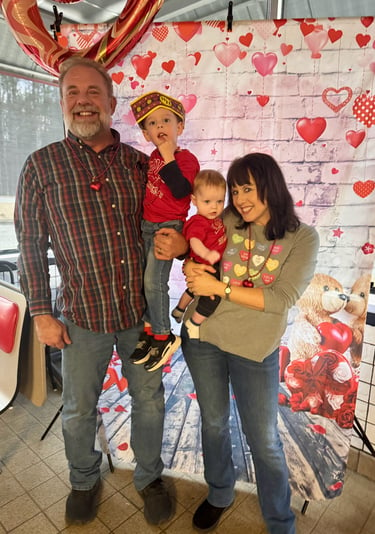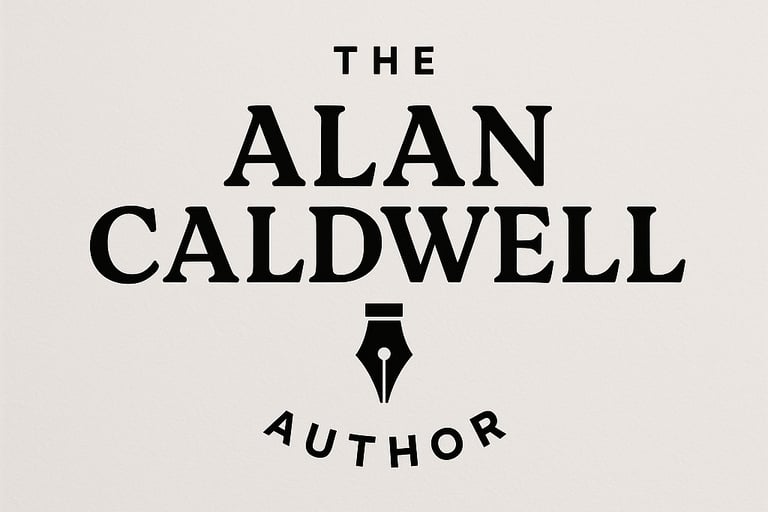Portfolio Showcase
A comprehensive list of publications from numerous locations! Take a moment explore my work!






Tour of Publications
“Those Who Can” is a short story by Alan Caldwell, published on You Might Need To Hear This, that explores the complexities of human relationships and personal growth. The narrative delves into the challenges faced by individuals striving to overcome their limitations and the impact of their choices on those around them.
In “Granny,” Alan Caldwell reflects on his lifelong fears and contrasts them with his grandmother’s remarkable resilience in the face of numerous hardships. The narrative delves into her unwavering courage amidst tragedies, highlighting the profound impact of fear and strength across generations.
In “FRIDAY: Crack,” Alan Caldwell narrates a poignant moment where a husband’s hurtful words lead to his wife’s emotional and physical pain after she trips on a sidewalk crack. The story delves into themes of regret, empathy, and the enduring complexities of long-term relationships.
In “Shiny,” Alan Caldwell tells the story of Jess, who, after her husband’s untimely death, grapples with feelings of inadequacy and her perceived lack of ‘shine’ compared to his cherished possessions. As she reflects on their life together and her own self-worth, the narrative delves into themes of grief, identity, and the human desire for validation.
In his essay “Gravel,” Alan Caldwell recounts the domestic violence he witnessed during his childhood, portraying his father’s abusive behavior and his mother’s submissive responses. The narrative reveals the unsettling routine of their conflicts and the coping mechanisms Caldwell developed to endure the turmoil.
In “MONDAY: Ladder-back Chair,” Alan Caldwell narrates a young boy’s recurring nocturnal encounters with a silent, pale man in a gray coat seated beside his bed, whose presence offers comfort during nightmares. The story culminates in a dramatic intervention where this mysterious figure protects the boy from his father’s abuse, leaving a lasting impression on his life.
Uncle Anse was always a goddamn wild man
In “Uncle Anse Was Always a Goddamn Wild Man,” Alan Caldwell portrays the tumultuous life of Uncle Anse, a man whose reckless and wild behavior leaves a lasting impact on his family. The narrative delves into themes of familial bonds, the consequences of unrestrained actions, and the complexities of personal freedom.
In “Sagging,” Alan Caldwell narrates Ruth’s return to her decaying childhood home, where she discovers a pristine quilt among her late mother’s belongings. As she rests on her mother’s bed, enveloped by the quilt, Ruth experiences a profound sense of peace, leading her into a deep sleep filled with nostalgic dreams of her youth.
In “The Damned Thing,” Alan Caldwell narrates a series of unsettling events where an unseen force causes objects to move inexplicably, leading to a pervasive sense of fear and paranoia. The protagonist grapples with the elusive nature of this entity, questioning his own perceptions and the reality of the malevolent presence.
Statue of Limitations
In “Statute of Limitations,” Alan Caldwell explores the enduring impact of past actions as the protagonist confronts the lingering consequences of a crime committed years earlier. The narrative delves into themes of guilt, justice, and the inescapable nature of one’s past.
In "Chicken Salad," Alan Caldwell reflects on his time in a mental health facility, where bonds formed over therapy sessions and shared trauma offer brief solace amid deep emotional pain. Through vivid portraits of fellow patients Maggie and Mike, the story explores resilience, the haunting effects of trauma, and the quiet comfort found in small, ordinary things—like a well-made chicken salad.
This haunting narrative follows a man cursed with an uncontrollable and mysterious transformation that causes him to awaken, bloodied and naked, in remote places after blacking out—often near scenes of brutal carnage. Condemned to a nomadic life for over a century without aging, he wrestles with guilt, isolation, and the horrifying consequences of a monstrous fate he cannot escape or fully understand.
In "Story," Alan Caldwell narrates an elderly man's quest into a secluded Appalachian valley to investigate the legend of "Old Scratch," a demonic entity feared for generations. His journey leads to a confrontation that blurs the lines between myth and reality, exploring themes of belief and the enduring power of folklore.
In "A Sick Place," Alan Caldwell tells of a man drawn to a serene forest glade that inexplicably induces nausea and dizziness. As he persists in visiting, he experiences a vivid dream revealing a forgotten, violent act, blurring the lines between memory and nightmare.
In "Knucks," Alan Caldwell portrays a young man's tumultuous journey through the gritty world of underground boxing. The story delves into themes of survival, identity, and the personal cost of violence.
In "with me," Alan Caldwell portrays a grieving father who, after the death of his daughter Alyssa, experiences vivid dreams where he observes her reliving moments from her life. These dreams blur the line between reality and the supernatural, culminating in a poignant encounter that suggests Alyssa's enduring presence.
In "Roots," Alan Caldwell tells the story of Doran, a man who stumbles upon an old, unmarked grave while hiking and becomes increasingly obsessed with uncovering its secrets. His fixation leads him to a chilling discovery that blurs the line between the living and the dead.
"Geraniums" Fiction
In "Geraniums," Alan Caldwell portrays a family's concern for their aging mother's well-being, highlighting her resilience and attachment to her garden. The narrative culminates in a poignant discovery that underscores themes of autonomy, familial bonds, and the complexities of aging.
In "Cane Pole," Alan Caldwell tells the story of a young boy who, after the recent deaths of his father and uncle, seeks solace in fishing—a skill imparted by his late uncle. As he releases his first catch back into the stream, following his uncle's tradition, the boy confronts his grief, leading to an emotional release that underscores themes of loss, remembrance, and the healing power of nature.
In "Grady Painted Water Towers," Alan Caldwell narrates the life of Grady, a traveling water tower painter whose fall from a platform leads to injury, addiction, and the loss of his family. As he wanders aimlessly, Grady finds solace when an old man offers him shelter, symbolizing a glimmer of hope amidst his despair.
In "Marbles," Alan Caldwell depicts a son's turmoil as he listens to his dying father's labored breathing, likened to marbles rolling on a floor. Haunted by past grievances and a promise to alleviate his father's suffering, the son confronts profound moral and emotional dilemmas.
In "Toast," Alan Caldwell tells the story of a man who, after a night of heavy drinking, awakens to find himself entangled in a mysterious and unsettling situation. As he pieces together the events of the previous night, he confronts disturbing revelations that challenge his perception of reality.
Featured across numerous sources!
In "Stripling Chapel," Alan Caldwell recounts a childhood memory of discovering an injured beagle on a rural road and seeking his elderly uncle's assistance. Confronted with the dog's suffering, they make a compassionate yet difficult decision, highlighting themes of empathy and the harsh realities of rural life
In "Safe Space," Alan Caldwell tells the story of a widowed man who, after retreating to a secluded cabin in the woods, begins experiencing unsettling sensations and vivid dreams. As these occurrences intensify over two weeks, he ultimately discovers his own frozen body outside the cabin, revealing that he has been a ghost unaware of his own death.
In "Just a Phase," Alan Caldwell tells the story of a mother who, after conceiving her son Chip through a traumatic assault, chooses to raise him despite societal pressures. As Chip grows, he begins sleepwalking and exhibiting unsettling behaviors, leading his mother to confront deep-seated fears and the haunting possibility of inherited violence.
In "Shower Drain," Alan Caldwell tells the story of Douglas, a salesman who finds solace in long, hot showers after exhausting workdays. His routine takes a disturbing turn when he begins hearing faint, angry voices discussing him through the shower drain, blurring the lines between reality and his mental state.
In "Amount To Much," a teacher reflects on a student's flippant remark that she wouldn't amount to much—words likely repeated from an adult in her life. The essay explores the lasting impact of what educators say and believe about students, ultimately revealing that the student succeeded in life, challenging the low expectations once placed on her.
In "Reflections on Retirement," a veteran teacher shares the emotional complexities of retiring after a long career, grappling with the fear of losing purpose and identity. Despite the uncertainty, the post embraces the possibility of new beginnings and continued impact beyond the classroom.
In “Insulated” by Alan Caldwell, the narrator reflects on the comforting and cleansing nature of rain, recalling a childhood memory where he expressed his fondness for it. This sentiment is later echoed during a somber funeral scene, where standing alone in the downpour provides a sense of solace and connection to the departed.
Explore Alan's journey through family tales, poetry, and much more!
© 2025. All rights reserved.

